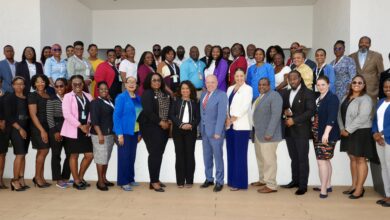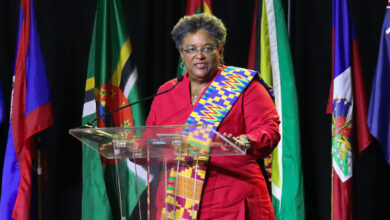“Climate change and natural disasters remain key drivers of displacements in the Region with the frequency and magnitude of events likely to increase in the future. This has contributed to many regional states facing demographic decline, which has impacted their workforce, our younger population seeking job opportunities outside the Region and many key sectors being negatively impacted.”
Alison Drayton, Assistant Secretary-General, Human and Social Development, CARICOM Secretariat
Wednesday 10 July 2024 (CARICOM Secretariat, Turkeyen, Greater Georgetown): The urgent and escalating impact of climate change on Small Island Developing States (SIDS) is a leading cause of displacement within the Caribbean Community. This is particularly significant following the recent devastation caused by Hurricane Beryl. Thousands of people are still without electricity, and many are in temporary shelters in St Vincent and the Grenadines and Grenada.
These were the concerns shared by Ms Alison Drayton, Assistant Secretary-General, CARICOM Secretariat, at the opening session of a workshop to design a migration policy framework that accurately reflects the needs and ambitions of the People of the Caribbean Community.
The CARICOM Secretariat and the CARICOM Implementation Agency for Crime and Security (IMPACS), in collaboration with the International Organization for Migration (IOM), are hosting the three-day workshop themed “Towards a Regional Approach to a Migration Policy in the Caribbean—Realizing A Shared Vision,” in Port-of-Spain, Trinidad and Tobago from 8 – 10 July. This activity involves National Focal Points (NFPs) from the CARICOM Member States and representatives of relevant regional and international organisations engaging in dialogue to craft the regional migration policy framework.
Addressing the NFPs and participants, Ms Drayton underscored the role that climate change plays in migration.
“It is evident that the Region has been facing, and will continue to face, various challenges that affect the lives and livelihoods of Caribbean citizens – namely due to climate change, which has amplified displacements and the need for persons to migrate from areas that threaten their livelihoods or limit their opportunities to prosper and provide for their families,” stated the ASG. “In fact, climate change and natural disasters remain key drivers of displacements in the Region with the frequency and magnitude of events likely to increase in the future. This has contributed to many regional states facing demographic decline, which has impacted their workforce, our younger population seeking job opportunities outside the Region, and many key sectors being negatively impacted.”
However, she observed that mitigating this challenge would be “a tall order.” The Assistant Secretary-General reiterated the Community’s commitment to work with the NFPs and other stakeholders involved in implementing a “forward-thinking regional migration policy” that would help address various aspects of regional migration and human mobility as determined by Member State priorities.
She expressed her gratitude to the Government of Trinidad and Tobago for hosting the workshop and noted the valuable technical contributions made by the United Nations (UN) Migration Group and financial contributions from the United States Department of State, the European Union, and the Inter-American Development Bank. Ms Drayton also acknowledged the significant contribution made by IOM, which has been supporting the advancement of the policy by providing consultancies to coordinate the Community’s work through the Regional Approach to Migration Policy (RAMP) Steering Committee and development of the framework.
Editor’s Notes:
Why a Regional Migration Policy?
In February 2019, at the 19th Special Meeting of the Conference of Heads of Government of the CARICOM Community on Security, CARICOM Heads of Government mandated “the CARICOM Secretariat, along with CARICOM Implementation Agency for Crime and Security (IMPACS), to collaborate with the relevant United Nations (UN) Agencies to develop a Regional Migration Policy.” As a result, the CARICOM Secretariat engaged the International Organization for Migration and the United Nations Network on Migration to support the Community in this effort. IOM activated the UN Network while the CARICOM Secretariat engaged multiple Community Institutions to create a steering committee and advisory group to provide broad international expertise and guidance.
Workshop participants:
The workshop brought together representatives from the 15 CARICOM Member States, as well as relevant regional and international organisations, including the CARICOM Secretariat, Caribbean Community (CARICOM) Implementation Agency for Crime and Security (IMPACS), Caribbean Public Health Agency (CARPHA), Caribbean Community Climate Change Centre (CCCCC), Caribbean Development Bank (CDB), the Organisation of Eastern Caribbean States (OECS), and multiple United Nations Agencies that participate in the UN Network on Migration, including IOM, International Labour Organization (ILO), United Nations High Commissioner for Refugees (UNHCR), UN Women, United Nations Children’s Fund (UNICEF), United Nations Office on Drugs and Crime (UNODC), Food and Agriculture Organisation (FAO) and others.
Helpful links:
CARICOM Stakeholders Meet to Craft Regional Approach to Migration Policy
Regional Policy Being Developed to Address Migration Priorities, Challenges and Opportunities
Second Workshop held to Develop Regional Migration Policy
Process to Develop Regional Migration Policy Progressing
Migration Governance Indicators – what are they?
https://gmdac.iom.int/migration-governance-indicators
Access validated MGI assessments and reports
https://www.migrationdataportal.org/dashboard-mgi-central-america-mexico-the-caribbean
Migration4Development (M4D) Video Docu-Series
- Migration 4 Development Part 1: Why a Migration Policy?
- Migation4Development | Part 2: Every Voice Must be Heard: Building a Migration Policy






